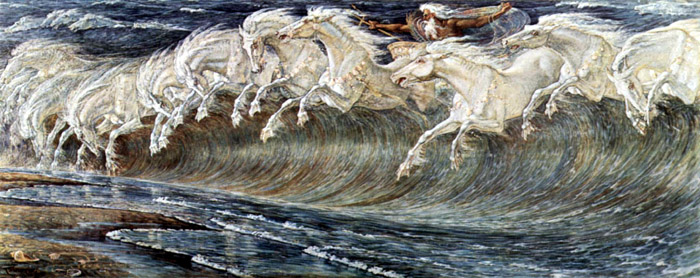By
John Townley
Some of the
great blessings
associated with Neptune, and
also among its curses, since it was officially discovered in 1849, have
been the
mysteries of pharmacopeia. The planet is closely linked with the
indefinable
chemistry of life that both allows us to explore and play with our
fundamental
biological processes and in the process better understand them or
completely
screw ourselves up trying.
It is often
said that the
principles of the outer planets
came most strongly into human awareness starting around the year of their
discoveries: Uranus (1786) for social
and technological revolution, Neptune (1846) for drugs and modern
mysticism,
Pluto (1930) for mass movements, faceless war and totalitarianism, for
three
brief takes. Those qualities were around (and assigned to other
planets), but
certainly the outer three crystallized our modern views of them. And
Neptune,
true to its nature, is the hardest one to pin down, being
quintessentially
elusive, even down to when the planet was actually discovered, which
was
spotted several times earlier (1612-13, 1795, 1830) but not identified
until Le
Verrier planted it firmly on the accepted sky map in 1846.
Being a
generationally borderline
Boomer (1945), I had the
privilege of maturing along with two major generational sets of natal
Neptune
aspects, specifically the Neptune trine with Uranus and the Neptune
square with
Uranus, which very much characterized the early and late post-WWII
generations,
as unalike as oil and water. Both have Neptune in Libra, but as Uranus
proceeds
at just twice Neptune’s speed, each has a different
Uranus-Neptune
relationship. Those born late in WWII (from 1943-on) and early post-War
roughly
have the trine, while those born in the mid-1950s have the square as
Neptune
finished
with Libra and entered Scorpio.
Both
together broadly make up the
“Pluto in Leo” generation
1940-1956, often said to define the social changes that made the 1960s
so
pivotally interesting culturally, but the subsets by Uranus-Neptune
aspect do
much to tell how and why the visionary revolutions of the
‘60s both succeeded
and failed. The essence of the period was unstoppable (Pluto)
revolutionary
(Uranus) spiritual (Neptune) change, in music, religion, philosophy,
and
politics, a great deal of it rooted in drug culture and the revelations
that
came when the Boomers turned on, tuned in, and then either experienced
bliss or
a psychological train wreck. The simple timeline tells you which came
first –
the bliss – and then the general train wreck that followed
it. And a look at
the players will tell you that those born with the Neptune-Uranus trine
enthusiastically discovered mind-altering drugs and their younger
siblings took
what seemed like a good thing at the time and showed just how badly it
could be
handled, turning the corner from flower children of Sgt. Pepper and the
1967 Summer of Love to swarms of cocaine-blasted
addicts on the mean streets
of the mid-1970s.


A bad view of
Uranus and Neptune screwed up drugs
and sex for a whole
generation, twice...
That may
sound like sour grapes
from someone from the trine
division, but it’s not. It’s not that we discovered
ambrosia and our kid
brothers and sisters screwed it all up (well, sometimes that was true),
as it’s
much more complicated than that. Indeed, it’s the younger
Boomers that might
blame us for selling them a bill of goods that backfired on them, a
surprise to
everyone. Sadly, it’s another repeat of a generational
Uranus-Neptune shift
that happened before, with similar results.
The benefits
and problems
of modern
drug usage only came into being around when Neptune was discovered.
Drugs of
one sort or another have been in use for millennia, but the ability to
synthesize and concentrate them to levels of killer effectiveness only
developed in the mid-nineteenth
century. Before then, drugs were taken in
their more dilute natural form and tended to be both less effective and
less
dangerous. The first widespread popularity of the newly-concentrated
drugs
cocaine and heroin appeared in the 1870s, as the first generation born
with
Uranus
sextile Neptune reached their twenties. From Freud on down, cocaine was
greeted
as a wonder drug to be shot, sniffed, and even put in soft drinks,
while heroin
was touted as a non-addictive cure-all substitute for morphine. For the
Uranus
sextile Neptune generation, they were all the rage, as drugs would
again to be
to the pre-and-early boomers of the twentieth
century. Then, as the next
generation of Uranus square Neptune arrived on the grownup scene, the
first signs of drug
addiction arose in a veritable flood, and by the early
twentieth
century, most refined “hard” drugs were banned.
That set the stage for the next
set of developments, when sex, drugs, and rock ‘n’
roll would once again
seduce, exalt, and sometimes destroy the best and brightest of tangent
generations.

Neptunes
horses, with or without Uranus, charge on for another round, more
generations, more changes.
Curiously,
the opening up of
sexuality in nineteenth
and twentieth century Western (at least) culture follows a parallel and
interconnected path. The same
generations that freely played with newly-found sexual freedom with
impunity
did so with drugs as well, and the ones that followed wound up paying
the price
in unwanted or unexpected disease and resulting repression from within
and
without. The freethinking, commune-building, free-sex movements of the
mid-to-late nineteenth
century gave way to a new “family values” prudery
and eventually prohibition. In both cases, the realms of fantasy and
self-indulgence
first fitted experimental reality hand in glove but then wound up
begetting
wrecks on the rocks of unintended excess or simply bad historical luck
(as with
AIDS).
Now that
Uranus and Neptune have
moved on past their
conjunction (in the early 1990s), and Generations X, Y, and beyond have
supplanted the Boomers, a more balanced understanding of sex, drugs,
and their
potentials is coming into focus, though the U.S. remains a bastion of
official
leftover repression mainly for reasons of political culture wars.
But as
the children born under these aspects come to maturity, we may see a
wiser, if younger, point of view come to power. Of course, as the
twenty-first century
proceeds, the square will again arrive, this time preceding the trine,
and it
will all change once more as the generational tides of inner experience
find
new aspects of old providers to build their alternating dreams and
nightmares,
as the biochemical matrix that our personalities dwell in necessarily
continues
to color our spiritual and scientific viewpoints...

